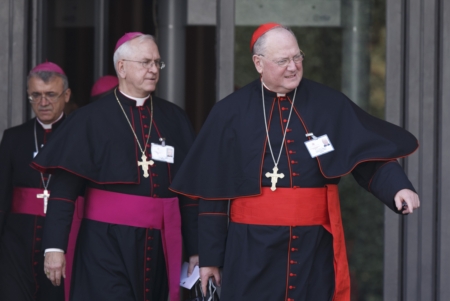Of the many significant events occurring in this year which marks the fiftieth anniversary of the opening of the Second Vatican Council in 1962, it is

Archbishop Joseph E. Kurtz of Louisville, Ky., and Cardinal Timothy M. Dolan of New York leave a meeting of the Synod of Bishops on the new evangelization at the Vatican Oct. 9. (CNS photo/Paul Haring)
worth noting the Synod on the New Evangelization that Pope Benedict has called to mark the beginning of this coming liturgical year as the “Year of Faith.” While the primary focus of the synod is not on moral theology per se, it is certainly true, as Paul VI highlighted in his apostolic exhortation, Evangelii Nuntiandi, that one of the primary ways that evanglization occurs in today’s world is through the moral witness provided by sincere Christians, indeed especially as this relates to living out the social teaching of the Church.
A brief survey of some of the themes covered by the Synod include reaching out to lapsed Catholics, confronting cultural secularism, and preaching the Gospel with humility and solidarity.
Alessandro Especiale of The Huffington Post recounts that ‘Washington Cardinal Donald Wuerl called on Christians to “overcome the syndrome of embarrassment” about their faith with a more assertive offense against the “tsunami of secular influence” that is sweeping away “marriage, family, the concept of the common good and objective right and wrong.”‘ And CNS reports that Archbishop Socrates Villegas stated that “The new evangelization calls for new humility,” Archbishop Villegas told the synod. “The Gospel cannot thrive in pride.”
It strikes me that as the Church struggles to find a way to authentically witness to the Gospel amidst a culture that is at times admittedly hostile there is a great temptation to return to an ecclesiology of the Church militant, to attempt to change the culture via aggressive tactics of moral suasion, engaging law and the state to enforce our ideals, and to denouncing the spirit of the age. As I have written elsewhere, I believe these tactics are ultimately counter-productive, as they tend to justify legislation that narrows civil rights (rather than expands them), foster resentment, ignore legitimate moral disagreement within and outside of the Church, limit respectful civil discourse, and worst of all, create division within the body of Christ.
As I see every day in my students, and as the philosopher Charles Taylor has eloquently captured, young people today are highly tuned in to authenticity and can sniff out insincerity and authoritarianism without batting an eye, and they will tune out just as quickly as they catch the scent of inauthenticity. Thus, I agree with Archbishop Villegas that humility is the number one virtue needed if Catholic leaders (whether lay, ordained, or religious) want to be heard. Humility, that attitude of spirit that David Hume dismissed as an irrelevant “monkish” virtue, is exactly the attitude of heart and mind that Jesus, as the Word made flesh, embodied in his human-divine form. “Blessed are the poor in spirit, for theirs in the kingdom of heaven” (Mt 5:3).
Moral theologians can contribute to this spirit within the Church by appealing to the tradition that underscores that true virtue is the fruit of the Holy Spirit (Gal 5:22-23) and of the action of grace in the soul. I’m dubious about whether or not this approach could – even should – win the “culture wars,” but even Jesus himself recognized this paradox – “What will it profit [us] if we gain the whole world, but forfeit [our] lives?” (Mt 16:26).
We can go back into the rich treasure of out theological, biblical, liturgical, and contemplative traditions to be like the “scribe who has been trained for the kingdom of heaven [who] is like the master of a household who brings out of his treasure what is new and what is old” (Mt 13:52). The New Evangelization looks outward to the world, accepting it in love like the open arms of St. Peter’s square in Rome, but in order to create that kind of hospitality for the world, we will need to look inward first so that what others see when they look at Christians and the Church is something they find beautiful and inviting.



